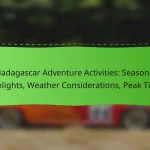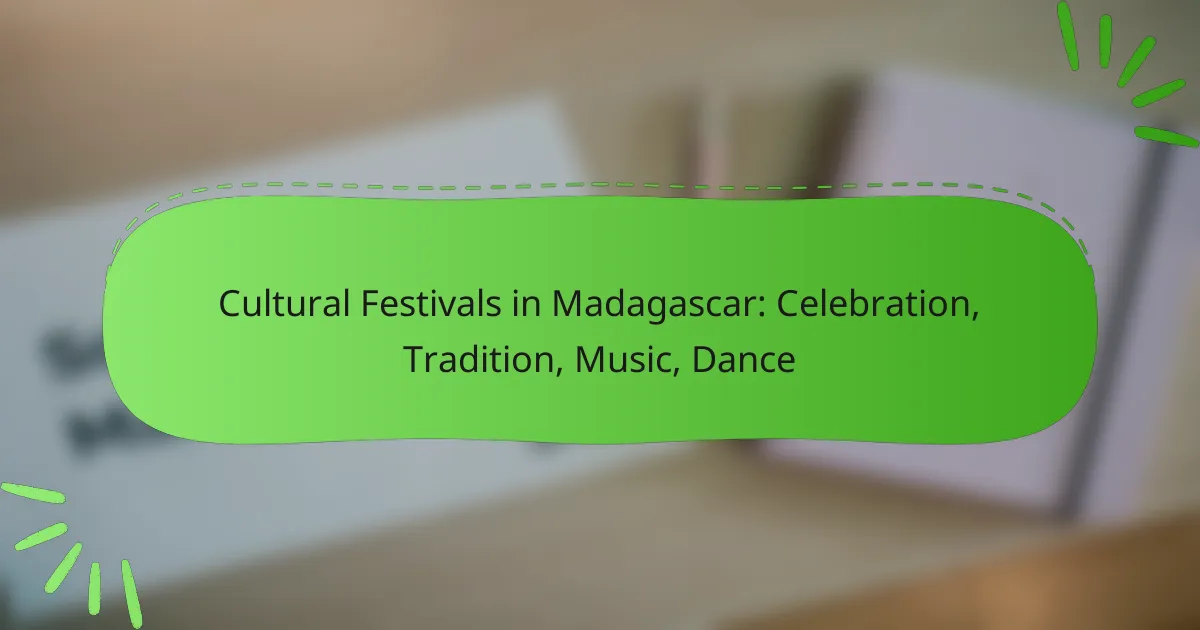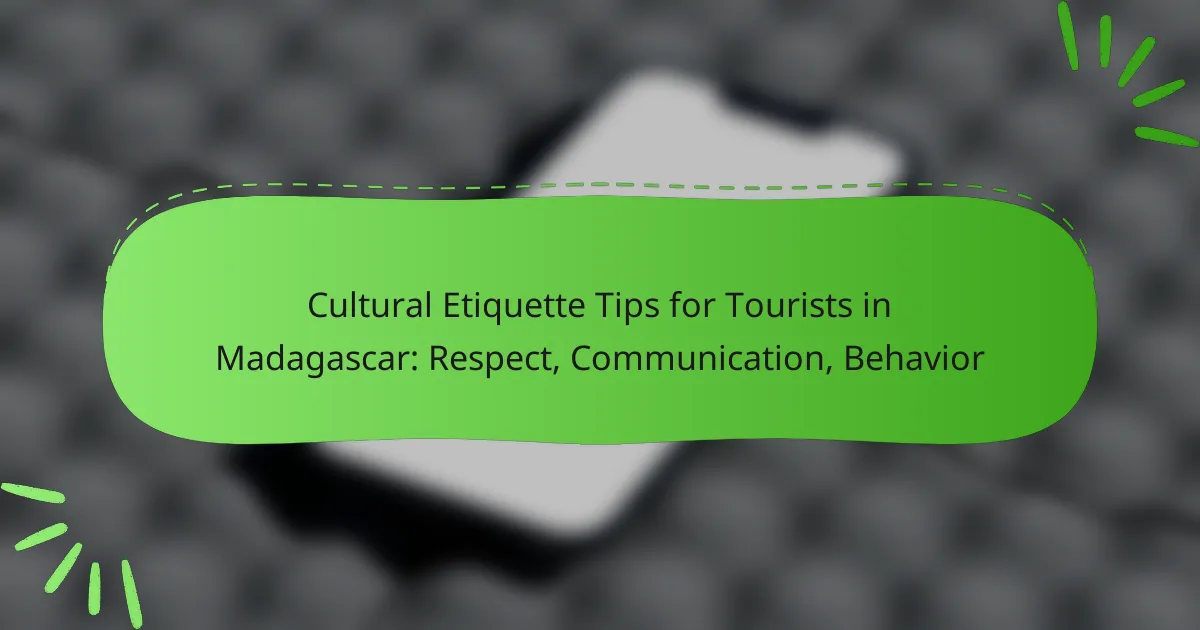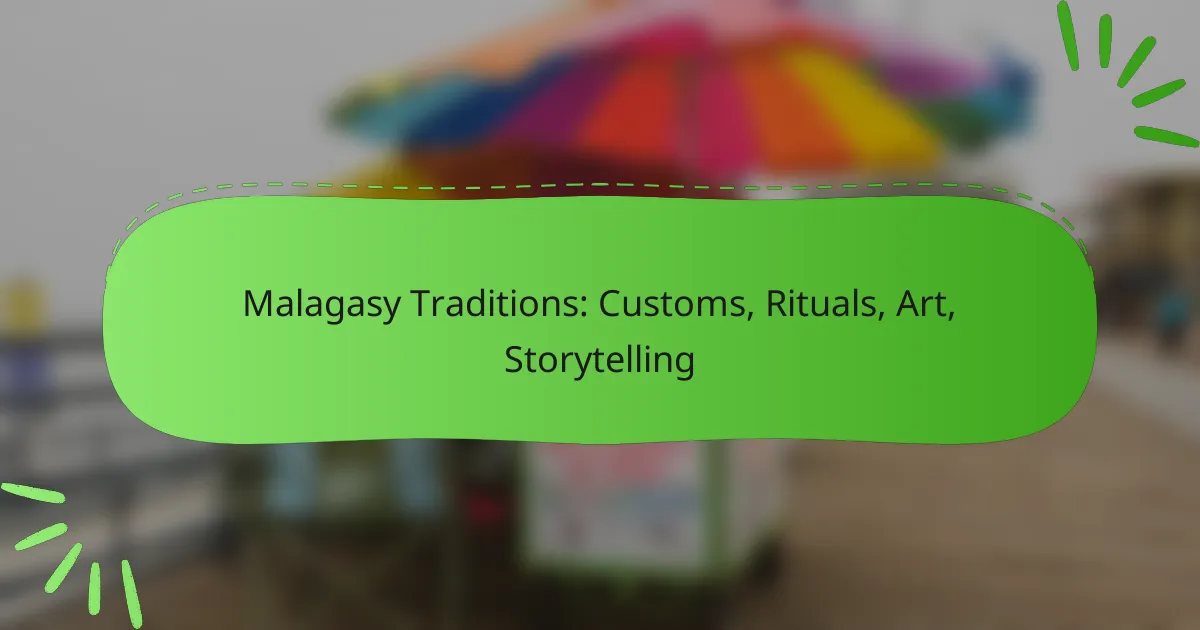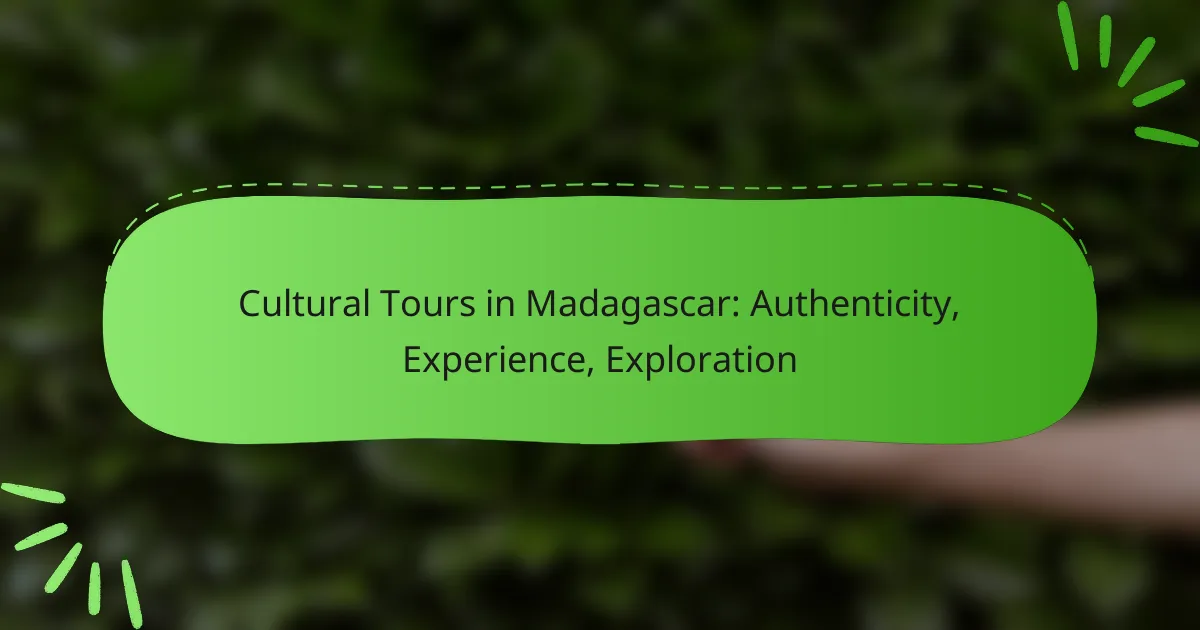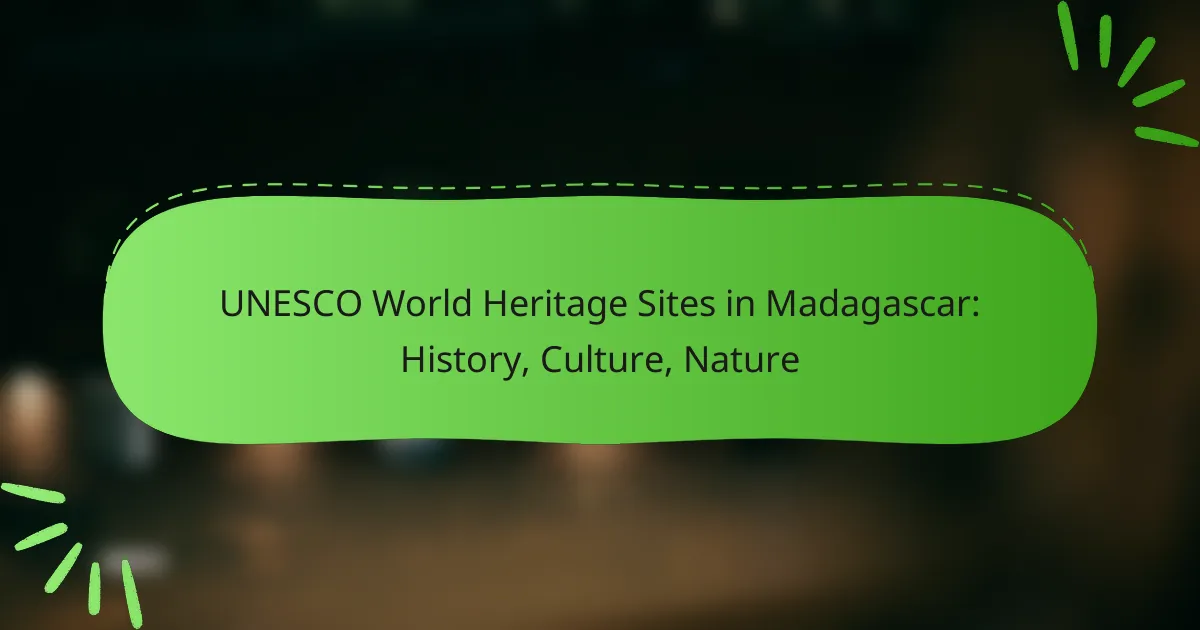Madagascar is renowned for its vibrant cultural festivals that celebrate the island’s rich heritage through music, dance, and traditional practices. Events such as Famadihana and the Donia Music Festival highlight the importance of community and spirituality, offering a unique glimpse into Malagasy culture and its deep-rooted traditions.

What are the most popular cultural festivals in Madagascar?
Madagascar hosts a variety of vibrant cultural festivals that celebrate its rich heritage through music, dance, and traditional practices. Key festivals include Famadihana, Hira Gasy, the Donia Music Festival, Alahamady Be, and the Festival of the Sacred Crocodiles, each showcasing unique aspects of Malagasy culture.
Famadihana
Famadihana, also known as the “turning of the bones,” is a significant ancestral celebration where families honor their deceased relatives. This festival typically occurs every five to seven years and involves exhuming the remains of ancestors, wrapping them in fresh shrouds, and dancing with the corpses to traditional music.
During Famadihana, families gather to celebrate their heritage, share stories, and reconnect with their ancestors. It is a time of joy, reflecting the belief that the deceased continue to influence the living, and it strengthens family bonds.
Hira Gasy
Hira Gasy is a traditional Malagasy musical performance that combines storytelling, music, and dance, often performed during festivals and community gatherings. This vibrant art form features live bands, singers, and dancers who narrate historical events, folklore, and social issues through engaging performances.
Attending a Hira Gasy event offers a unique insight into Malagasy culture and values. The performances are usually interactive, encouraging audience participation, which enhances the communal spirit of the festival.
Donia Music Festival
The Donia Music Festival, held annually in Nosy Be, is a celebration of music that attracts local and international artists. This festival showcases a variety of genres, including traditional Malagasy music, reggae, and pop, providing a platform for cultural exchange and artistic collaboration.
With performances, workshops, and activities, the Donia Music Festival fosters a lively atmosphere, drawing thousands of attendees. It’s an excellent opportunity for visitors to experience Madagascar’s diverse musical landscape while enjoying the island’s natural beauty.
Alahamady Be
Alahamady Be marks the Malagasy New Year and is celebrated with various customs and rituals. This festival typically occurs in late September or early October and signifies the start of the agricultural year, making it a time for renewal and gratitude.
During Alahamady Be, families prepare special meals, visit local markets, and engage in community festivities. Traditional dances and music are integral to the celebrations, highlighting the importance of cultural heritage in welcoming the new year.
Festival of the Sacred Crocodiles
The Festival of the Sacred Crocodiles takes place in the village of Soavinandriana and celebrates the local reverence for crocodiles, which are considered sacred. This unique festival features rituals, dances, and offerings to honor these creatures, reflecting the deep connection between the community and nature.
Visitors can witness traditional ceremonies and learn about the cultural significance of crocodiles in Malagasy folklore. The festival emphasizes the importance of conservation and respect for wildlife, making it a meaningful experience for both locals and tourists.

How do cultural festivals reflect Madagascar’s traditions?
Cultural festivals in Madagascar serve as vibrant expressions of the island’s rich traditions, showcasing its unique heritage through various forms of celebration. These festivals highlight the importance of community, spirituality, and the arts, deeply rooted in the Malagasy way of life.
Rituals and Ancestor Worship
Rituals play a crucial role in Madagascar’s cultural festivals, often centered around ancestor worship. Many festivals include ceremonies that honor deceased family members, reflecting the belief that ancestors continue to influence the living. Events like the Famadihana, or “turning of the bones,” involve exhuming and rewrapping the remains of ancestors, allowing families to reconnect and celebrate their lineage.
These rituals are not only spiritual but also serve to strengthen familial bonds and community ties. Participants often dress in traditional attire, and the atmosphere is filled with music and dance, creating a festive environment that honors the past while fostering unity among the living.
Traditional Music and Dance
Traditional music and dance are integral to Madagascar’s cultural festivals, showcasing the island’s diverse ethnic groups and their unique artistic expressions. Each region has its own musical styles, often featuring instruments like the valiha (a bamboo tube zither) and the marovany (a box zither). Festivals provide a platform for these musical traditions to thrive, with performances that engage the audience and encourage participation.
Dances are typically performed in groups, with movements that tell stories or celebrate historical events. The lively rhythms and colorful costumes create an immersive experience, allowing attendees to appreciate the cultural richness of Madagascar while fostering a sense of pride in their heritage.
Local Cuisine and Crafts
Local cuisine and crafts are essential components of Madagascar’s cultural festivals, offering a taste of the island’s culinary diversity and artisanal skills. Festivals often feature food stalls where visitors can sample traditional dishes like romazava (a meat and vegetable stew) and ravitoto (pork with cassava leaves). These dishes highlight the use of local ingredients and reflect regional flavors.
In addition to food, crafts such as weaving, pottery, and wood carving are showcased, allowing artisans to display their skills. Visitors can purchase handmade items, supporting local economies and preserving traditional crafts. Engaging with these culinary and artistic offerings enhances the festival experience, connecting attendees to Madagascar’s cultural heritage.
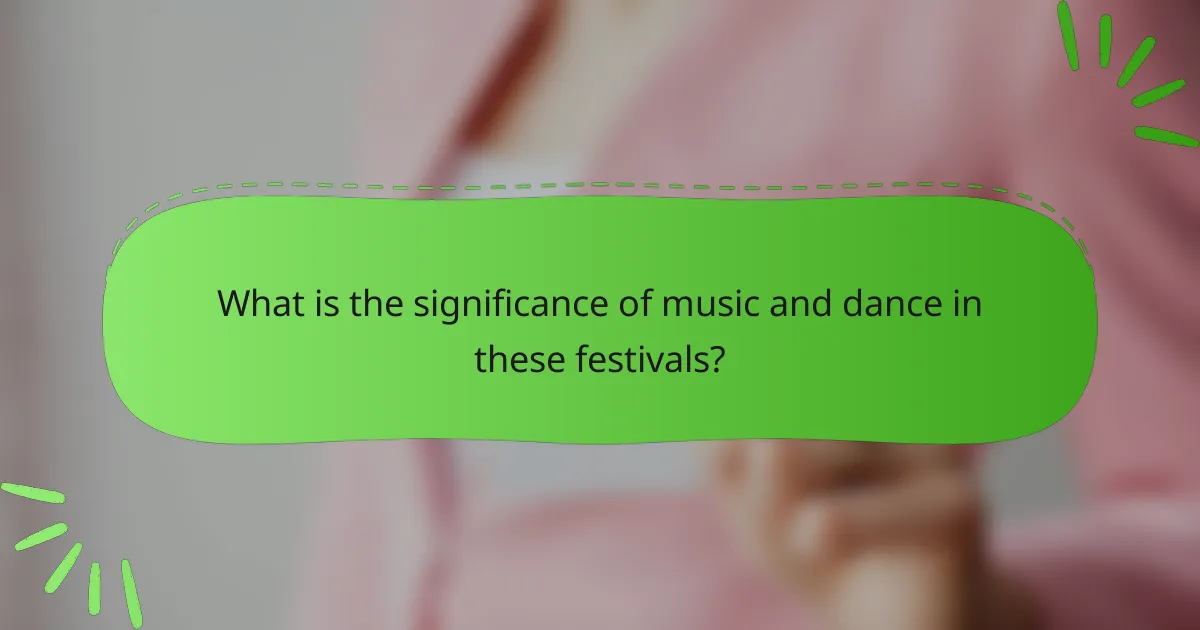
What is the significance of music and dance in these festivals?
Music and dance play a vital role in Madagascar’s cultural festivals, serving as essential expressions of the island’s rich traditions and communal values. They enhance the celebratory atmosphere, allowing participants to connect with their heritage and each other.
Expression of Identity
In Madagascar, music and dance are powerful tools for expressing cultural identity. Each ethnic group has its unique styles, instruments, and movements that reflect their history and beliefs. For instance, the Merina people often perform the Hira Gasy, a theatrical form that combines song and dance to narrate local stories.
This expression of identity not only fosters pride among community members but also educates visitors about the diverse cultures present in Madagascar. Festivals often showcase these distinct performances, allowing for a vibrant display of the island’s cultural tapestry.
Community Bonding
Music and dance during festivals serve as a means of strengthening community bonds. Participating in these activities encourages collaboration and unity among attendees, as they come together to celebrate shared traditions. Group dances, such as the Tsapiky, invite everyone to join in, creating a sense of belonging.
Moreover, these communal experiences often lead to the formation of lasting friendships and networks, reinforcing social ties that are crucial for community resilience. The joy and energy generated through collective participation enhance the overall festival experience.
Preservation of Heritage
Festivals in Madagascar are essential for preserving the island’s cultural heritage through music and dance. Traditional songs and dances are passed down through generations, ensuring that customs are not forgotten. This transmission is often facilitated by performances during festivals, where elders teach the youth.
Additionally, the emphasis on traditional music and dance helps to maintain the unique characteristics of Madagascar’s diverse cultures. By celebrating these art forms, communities actively resist cultural homogenization and promote the continuation of their rich legacies.
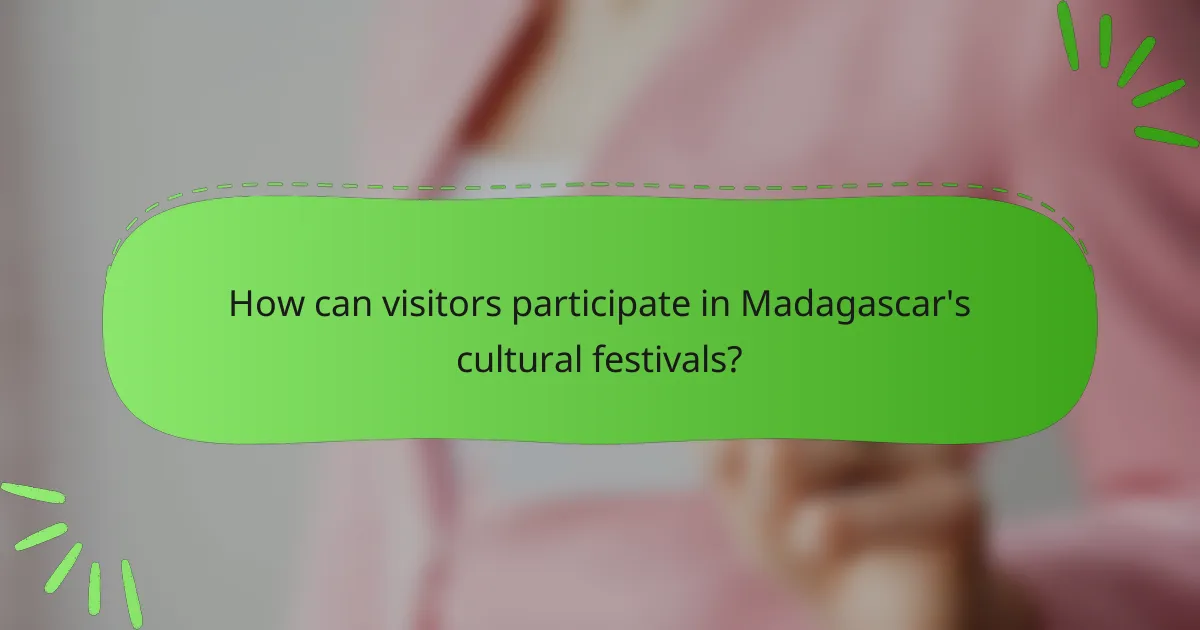
How can visitors participate in Madagascar’s cultural festivals?
Visitors can actively engage in Madagascar’s cultural festivals by attending local events, booking guided tours, and connecting with local communities. These experiences offer a unique opportunity to immerse oneself in the rich traditions, music, and dance of the Malagasy people.
Joining Local Celebrations
Participating in local celebrations is one of the most authentic ways to experience Madagascar’s vibrant culture. Festivals such as the Famadihana, or “Turning of the Bones,” allow visitors to witness traditional rituals and communal gatherings. Visitors should check local calendars to find festivals that coincide with their travel dates.
When attending, dress modestly and be respectful of local customs. Engaging with locals can enhance the experience, so learning a few basic phrases in Malagasy can be beneficial.
Booking Guided Tours
Booking guided tours is an excellent way to navigate Madagascar’s cultural festivals with ease. Many tour operators offer packages that include festival access, transportation, and local insights. These tours often provide a structured itinerary, allowing visitors to maximize their experience without the stress of planning.
Consider choosing tours that focus on specific festivals or cultural aspects, such as music or dance. Prices can vary widely, so it’s advisable to compare options and read reviews before making a decision.
Engaging with Local Communities
Engaging with local communities during festivals can deepen your understanding of Malagasy culture. Many festivals encourage visitors to participate in traditional dances and music, fostering a sense of connection. Look for opportunities to volunteer or join workshops that showcase local crafts or culinary traditions.
Be open and respectful when interacting with community members, as this can lead to meaningful exchanges. Remember that building relationships takes time, so approach these interactions with patience and genuine interest.
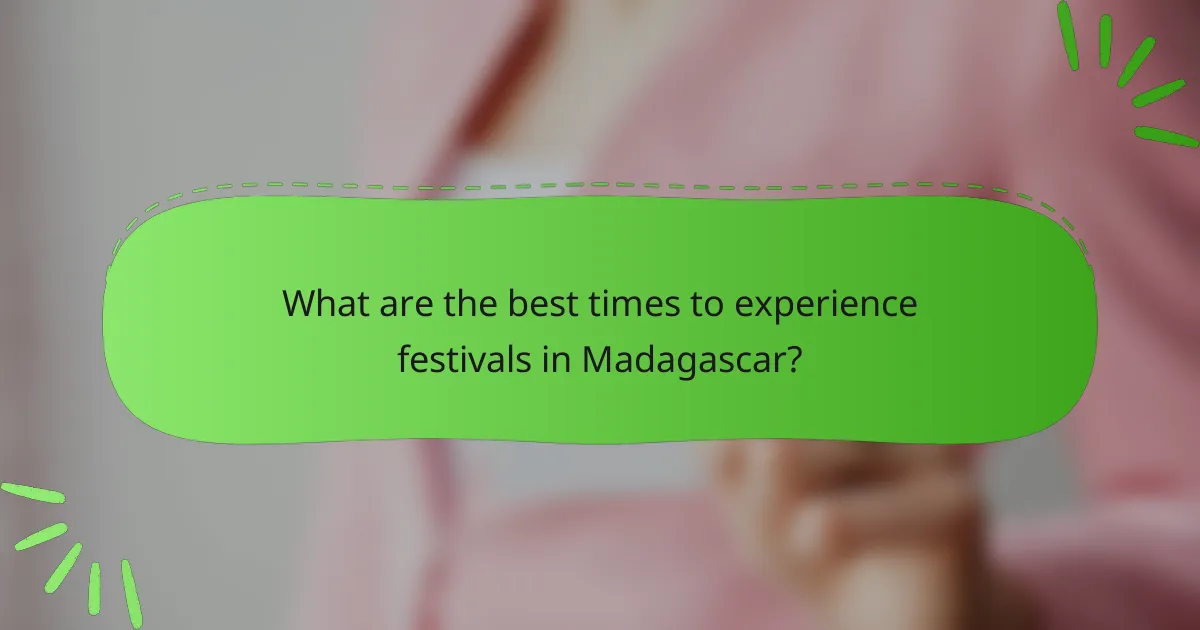
What are the best times to experience festivals in Madagascar?
The best times to experience festivals in Madagascar typically align with the country’s dry season, which runs from May to October. During this period, various cultural celebrations take place, showcasing the rich traditions, music, and dance of the Malagasy people.
Seasonal Festivals Overview
Madagascar hosts a variety of seasonal festivals that reflect its diverse cultural heritage. Notable events include the Famadihana, or “Turning of the Bones,” celebrated in July and August, where families honor their ancestors. The Donia Festival in Nosy Be, usually held in May, features music, dance, and local cuisine, attracting both locals and tourists.
Other significant festivals include the Hira Gasy, a traditional theatrical performance that combines music and dance, celebrated throughout the year, and the Independence Day festivities on June 26, which showcase national pride through parades and cultural displays.
Peak Tourist Seasons
Peak tourist seasons in Madagascar coincide with the festival calendar, particularly from July to September. During these months, travelers flock to the island to participate in and witness the vibrant celebrations. This is also the time when accommodations and flights may be more expensive due to increased demand.
Visiting during the peak season allows tourists to experience the cultural richness of the festivals, but it is advisable to book accommodations and travel arrangements well in advance to secure the best options.
Weather Considerations
The weather in Madagascar varies significantly by region and season, impacting festival experiences. The dry season from May to October generally offers pleasant weather, making it ideal for outdoor celebrations. However, the eastern coast can still experience occasional rain.
Travelers should prepare for warm temperatures during the day and cooler nights, especially in highland areas. It’s wise to check local forecasts and pack accordingly to ensure comfort while enjoying the festivities.
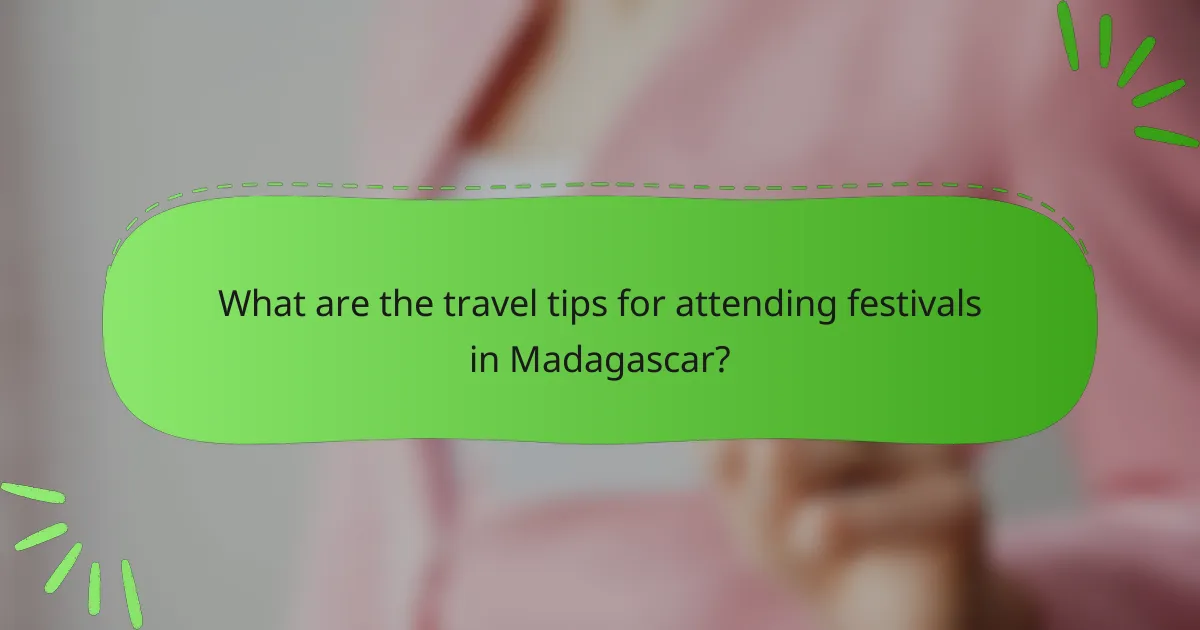
What are the travel tips for attending festivals in Madagascar?
To fully enjoy festivals in Madagascar, plan your visit around the specific dates of the events and consider local customs. Understanding the cultural significance of each festival will enhance your experience and help you engage respectfully with the community.
Timing Your Visit
Festivals in Madagascar often coincide with specific seasons or agricultural cycles, so timing is crucial. Major events like the Famadihana (the turning of the bones) typically occur between June and September. Check local calendars to ensure you don’t miss out on key celebrations.
Understanding Local Customs
Each festival has unique traditions that reflect Madagascar’s rich cultural heritage. For example, during the Hiragasy festival, traditional music and dance play a central role. Familiarizing yourself with these customs can help you participate more meaningfully and show respect to the local community.
Transportation and Accommodation
Book your accommodation well in advance, as hotels can fill up quickly during festival periods. Consider staying in nearby towns to experience local life. Public transport options like taxi-brousse (shared taxis) are available, but plan for potential delays due to increased traffic during events.
What to Bring
Pack lightweight clothing suitable for warm weather, as many festivals take place outdoors. Bringing a camera is essential for capturing the vibrant atmosphere, but be mindful of local customs regarding photography. Also, consider carrying cash in Malagasy Ariary, as some vendors may not accept cards.
Safety and Etiquette
While Madagascar is generally safe, remain aware of your surroundings, especially in crowded areas. Respect local traditions and dress modestly, particularly during religious or cultural ceremonies. Engaging with locals politely can enhance your experience and foster goodwill.

